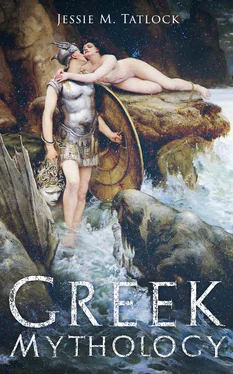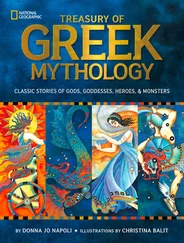J. M. Tatlock.
December, 1916.
Table of Contents
Primitive people, as they have looked out on the world about them, on the sea and the trees, on the sky and the clouds, and as they have felt the power of natural forces, the heat of the sun, the violence of the wind, have recognized in these things the expression and action of some being more powerful than themselves. Able to understand only those motives and sensations that are like their own, they have conceived these beings more or less after their own nature. The Hebrews, indeed, at an early time recognized one supreme God, who had created and who directed all the world according to his will, but most other early people have seen living, willing beings in the forms and powers of nature, and have worshiped these beings as gods or feared them as devils. Physical events, such as the rising and setting of the sun, or the springing and ripening of the grain, are to them actions of the beings identified with sun or grain. In accounting for these acts, whether regularly recurring, as the rising of the sun, or occasionally disturbing the ordinary course of nature, as earthquakes, eclipses, or violent storms, stories more or less complete grow, are repeated, and believed. These stories told of superhuman beings and believed by a whole people are myths, and all these myths together form a mythology.
The mythology of any people is interesting because it reflects their individual nature and developing life; that of the Greeks is more interesting to us than any other, first, because it expresses the nature of a people gifted with a peculiarly fine and artistic soul; secondly, because our own thought and art are, in great part, a heritage from the civilization of Greece. Much of this heritage comes to us quite directly from the Greek writers and artists whose works have been preserved. The dramas of Sophocles and Euripides hold an audience in America as they held those in Athens, because their art is true and great; the noble youth of the Hermes of Praxiteles, 'or the gallant action of the horsemen in the frieze of the Parthenon satisfy us in the twentieth century as they did the Greeks in the fifth and fourth centuries B.C. But more of this heritage comes down to us through the Romans, whose genius taught them to conquer and govern without destroying, and who learned from the nations that they conquered, Egypt, Asia, and Greece, all that centuries of rich civilization had to give. The civilization of the modern world, America as well as Europe, is rooted deeply in the civilization of Rome, and through Rome in that of Greece. Greek thought and Greek principles run through our law, our government, our standards of taste, our art, and our literature. The very personages of Greek mythology are familiarly known to-day in the United States, divorced from religious meaning but set up before our eyes as symbols of truths that are in the very nature of things. The winged Mercury (the god of travelers, whose Greek name was Hermes) waves his magic wand above the main entrance to the Grand Central Station in New York; the noble head of Minerva (the Greek Athena, the goddess of wisdom) is set above the doors of our libraries and colleges, and the adventures of Ulysses (or Odysseus) and of many other Greek heroes are painted on the walls of our Congressional Library. Even in our daily language there is still a hint of mythology: our troops still march to martial music, the music of the war-god Mars, and we eat at breakfast cereals, the gift of the corn-goddess Ceres; the Muses of Pieria are not too far away to inspire the music of our western world.
These beliefs and stories have been handed down through so many ages and modified in so many ways that confusion as to their real origin has naturally arisen. It is Greek, not Roman. The Romans did not develop an original mythology but took over stories from the Greeks and others and told them of their own gods. It was the Greek Zeus, not the Roman. Jupiter, who had so many love adventures; it was the Greek Aphrodite, not the Roman Venus, who received the golden apple from Trojan Paris. Classical mythology is the expression of the nature and thought of the Greeks, not that of the Romans. For the Greeks were by nature artistic; they instinctively expressed their ideals, the truth as they saw it, in poetry, story, and sculpture, and because imagination, insight, and love of beauty were united in them, their stories and their art have an appeal that is universal
The religion and mythology of the Greeks was not a fixed unchanging thing; it varied with different localities and changed with changing conditions. For when we speak of Greece we do not speak of a nation in the strict sense — that is, a people under one central government — but of the Greek race: " Wherever the Greeks are, there is Greece." So the mythological stories grew and changed as they passed from Asia Minor to Greece, or from Greece to the islands of the Ætan Sea, to Italy and Sicily. Moreover, the independence of the individual in the Greek states, where men thought for themselves, and no autocratic government or powerful priesthood exerted undue restraint, fostered variety and permitted artists and poets so to modify tradition as to express something of their individual ideas. This added infinitely to the richness of mythology and art. Local conditions, too, and local pride, in a country broken both geographically and politically into small divisions, added variety to religious customs. In mountain districts the god of the sky and storms was most feared and worshiped, in the fertile plains, the gods of earth and harvest, while on the coast men needed the favor of the gods who were powerful over the sea and protected "commerce. Local heroes gathered stories about themselves, and local pride led people to place important events, such as the birth of a god or some important manifestation of his power, in their own localities. Many different places claimed to be the birthplace of Apollo, and the fires of Hephæstus burned within many a volcano (called after his Latin name, Vulcan). Furthermore, as they came in contact with other peoples and became familiar with their religious stories and ceremonial, they incorporated much that was of foreign origin into their own religion. The stories connected with Dionysus, or Bacchus, and the extravagant rites celebrated in his honor were imported from the East, and the Aphrodite of Asia Minor was far more Asiatic and sensual in character than the Aphrodite of Greece. Finally, since mythology is not based on authority but grows from the soul of the people, it necessarily follows that as Greek life and thought grew and developed, as social conditions changed, as art was perfected and poetry and philosophy grew less simple, the telling of the myths and their interpretation changed and developed. Mythology was a living, growing thing, impossible to seize and fix in a consistent system. It must be regarded as a mass of legend, handed down through the people and poets of generation after generation, continually reflecting the developing life and soul of a great and vital race. When different versions of a story are found, one is not necessarily more authentic than another; in the present book that version is given which has become most famous in art and literature.
Before proceeding to the mythological stories that spring from the Greek religion, it is well to notice some of the more marked characteristics of that religion.
(1) It was polytheistic, it was the worship of many gods. The supremacy of Zeus, " father of gods and king of men," over the other gods did not make the religion a monotheism any more than the hegemony or leadership of one Greek state over others made Greece one united nation.
(2) The religion was, in origin, a worship of the powers of nature. This is natural to primitive men everywhere, because these are the first powers outside of themselves of which men are conscious. The intensity of the Greek sun, the nearness of the sea and its importance in the daily life of the people, the mountain barriers about them, all tended to emphasize men's dependence upon nature. But as the Greeks developed in intelligence and civilization, as their thoughts and their lives became less simple, and abstract ideas entered into the government of their actions, these nature gods assumed ethical or moral meanings. So the thunder of Zeus, originally his weapon as sky-god, became the symbol of his world power as god of law and order. The clear, illuminating brightness of the sun made of the god of light, Apollo, the all-seeing prophet, who in his worshipers required purity. Athena, who, owing to the story of her birth from her father Zeus's head when Hephæstus had cleft it, is generally supposed to have represented the descent of the storm when the thunderbolt has opened the heavens, almost lost this original meaning, and became the goddess of practical wisdom and of skill in war.
Читать дальше












